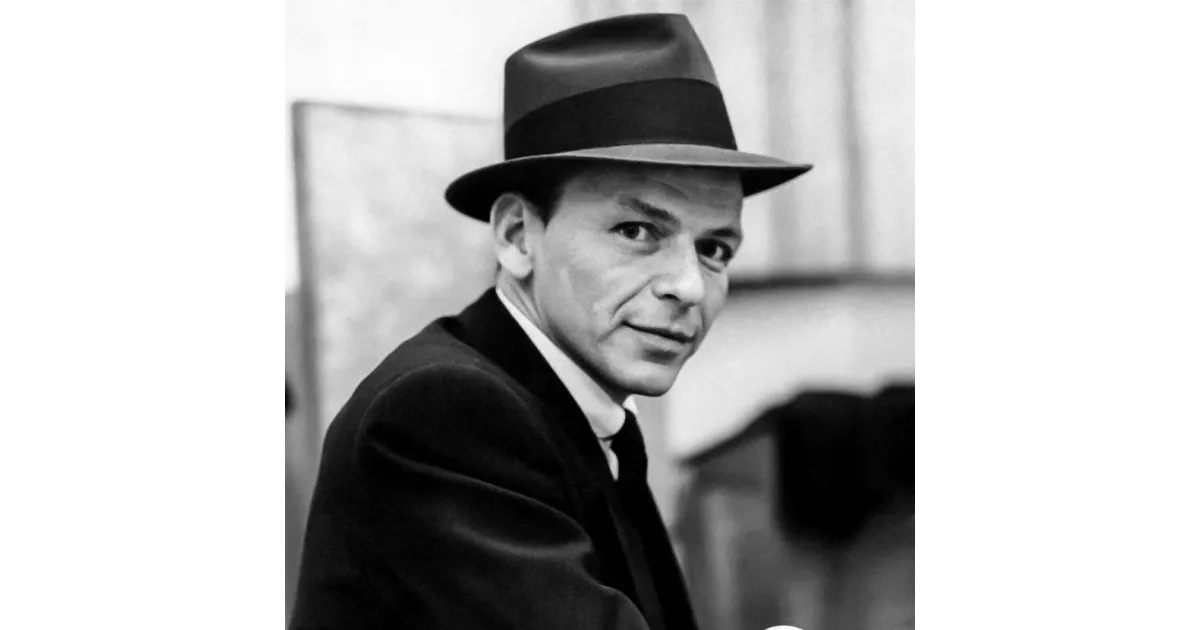How education and upbringing influenced the life of Frank Sinatra. A timeline of key moments.
Frank Sinatra, nicknamed "Chairman of the Board" and "Ol' Blue Eyes", was a highly popular and influential American singer and actor of the 20th century. He is considered one of the best-selling music artists globally, with estimated record sales of 150 million. Sinatra's impact on music and entertainment remains significant.
1944: Campaigning for the Democrats
After meeting President Franklin D. Roosevelt in 1944, Frank Sinatra heavily campaigned for the Democrats in the 1944 presidential election.
October 30, 1947: Awarded Key to the City in Hoboken
On October 30, 1947, Frank Sinatra was awarded the Key to the City by Mayor Fred M. De Sapio in his native Hoboken.
1948: Campaigning for Harry S. Truman
In 1948, Frank Sinatra actively campaigned for President Harry S. Truman.
1952: Campaigning for Adlai Stevenson
In 1952, Frank Sinatra campaigned for Adlai Stevenson.
1953: Sinatra's Visit to Frenchay Hospital
In 1953, Frank Sinatra visited Frenchay Hospital, which used to sit at the site of a new housing development. This visit was later commemorated in 2024 with a road being named after him.
1953: Split with Ava Gardner
In 1953, Frank Sinatra's split with Ava Gardner had a profound impact on the types of songs he sang and on his voice. He began to console himself in songs with a "brooding melancholy".
June 1955: Support for Lee J. Cobb after heart attack
In June 1955, after Lee J. Cobb suffered a heart attack, Frank Sinatra provided him with gifts, paid his hospital bills, and offered encouragement during his recovery.
1956: Campaigning for Adlai Stevenson
In 1956, Frank Sinatra campaigned for Adlai Stevenson.
May 1959: Sinatra Writes Article for Inter-Racial Friendship
In May 1959, Frank Sinatra wrote an article titled "You Can't Hate and be Happy" for "What the Stars Say", a publication by the Stars Campaign for Inter-Racial Friendship, following the murder of Kelso Cochrane in London.
September 19, 1959: Sinatra Hosts Luncheon for Nikita Khrushchev
On September 19, 1959, Frank Sinatra was asked by 20th Century Fox to be the master of ceremonies at a luncheon attended by Soviet Premier Nikita Khrushchev.
January 1961: Organization of Inaugural Gala for John F. Kennedy
In January 1961, Frank Sinatra and Peter Lawford organized the Inaugural Gala in Washington, D.C., for President John F. Kennedy.
1961: Performances for Mexican Charities
In 1961, Frank Sinatra traveled to Mexico to perform for Mexican charities.
1962: Performances for Mexican Charities
In 1962, Frank Sinatra traveled to Mexico to perform for Mexican charities.
1963: King wept at Sinatra concert
In 1963, Martin Luther King Jr. sat weeping in the audience at one of Frank Sinatra's concerts as Sinatra sang "Ol' Man River".
July 1964: Dedication of the Frank Sinatra International Youth Center
In July 1964, Frank Sinatra attended the dedication of the Frank Sinatra International Youth Center for Arab and Jewish children in Nazareth.
June 1965: Benefit Concert for Dismas House
In June 1965, Frank Sinatra, along with Sammy Davis Jr. and Dean Martin, performed live in St. Louis to benefit Dismas House, a prisoner rehabilitation and training center.
February 8, 1967: Teamsters Charity Concert
On February 8, 1967, Frank Sinatra performed at a Teamsters annual charity concert in St. Louis, Missouri, to benefit the Dismas Clark Half-Way House, featuring the Rat Pack with Sammy Davis Jr. and Dean Martin.
1968: Working with Hubert H. Humphrey
In 1968, Frank Sinatra worked with Hubert H. Humphrey and remained a supporter of the Democratic Party.
November 2, 1970: Last Songs Recorded Before Retirement
On November 2, 1970, Frank Sinatra recorded his last songs for Reprise Records before announcing his retirement the following June.
1970: Endorsement of Ronald Reagan
In 1970, although still a registered Democrat, Frank Sinatra endorsed Republican Ronald Reagan for a second term as Governor of California.
1970: Shift in political affiliations
In 1970, when Frank Sinatra changed his political affiliations, he became less outspoken on racial issues.
July 1972: Support for Richard Nixon
In July 1972, Frank Sinatra officially changed his political allegiance and supported Richard Nixon in the 1972 presidential election.
October 20, 1972: Performance at Young Voters Rally
On October 20, 1972, Frank Sinatra performed "My Kind of Town" at a Young Voters Rally in Chicago at the request of President Richard Nixon.
1976: Reunion of Dean Martin and Jerry Lewis and Awards
During Labor Day weekend in 1976, Frank Sinatra reunited Dean Martin and Jerry Lewis at the "Jerry Lewis MDA Telethon". In 1976, The Friars Club selected Sinatra as the "Top Box Office Name of the Century", and he received the Scopus Award from the American Friends of the Hebrew University of Jerusalem and an honorary Doctor of Humane Letters from the University of Nevada.
1976: Induction into the Catholic Sovereign Military Order of Malta
In 1976, despite his earlier criticisms of the church, Frank Sinatra was inducted into the Catholic Sovereign Military Order of Malta.
January 1977: Death of Dolly Sinatra and Royal Albert Hall Performance
In January 1977, Frank Sinatra's mother, Dolly, died in a plane crash while traveling to see him. He canceled shows and spent time in Barbados. In March 1977, he performed at the Royal Albert Hall in London, raising money for charity.
1977: Turn to Catholicism after mother's death
In 1977, after his mother died in a plane crash, Frank Sinatra turned to Catholicism for healing.
1978: Lawsuit Against Land Developer
In 1978, Frank Sinatra filed a $1 million lawsuit against a land developer for using his name in the "Frank Sinatra Drive Center" in West Los Angeles.
1979: Awards and Performance in Egypt
In 1979, during a party at Caesars, Frank Sinatra was awarded the Grammy Trustees Award, celebrating 40 years in show business and his 64th birthday. Also in 1979, former President Gerald Ford awarded Sinatra the International Man of the Year Award, and he performed in front of the Egyptian pyramids for Anwar Sadat, raising money for charity.
1980: Donation to Ronald Reagan's campaign
In the 1980 presidential election, Frank Sinatra donated $4 million to Ronald Reagan's campaign and arranged Reagan's Presidential gala.
September 21, 1983: Lawsuit Against Kitty Kelley
On September 21, 1983, Frank Sinatra filed a $2 million court case against Kitty Kelley before her unofficial biography, 'His Way', was published.
September 19, 1984: Dropped case against Kitty Kelley
On September 19, 1984, Frank Sinatra was forced to drop his case against Kitty Kelley, with several leading newspapers expressing concerns about censorship.
1984: Honorary Doctorate of Fine Arts from Loyola Marymount University
In 1984, Frank Sinatra received an Honorary Doctorate of Fine Arts from Loyola Marymount University.
January 1985: Reconciliation with Nelson Riddle
In January 1985, Frank Sinatra and Nelson Riddle reconciled at a dinner for Ronald Reagan, after a major falling out. Sinatra asked Riddle to make another album with him, but Riddle died before they could record.
1985: Honorary Doctorate of Engineering from the Stevens Institute of Technology
In 1985, Frank Sinatra received an Honorary Doctorate of Engineering from the Stevens Institute of Technology.
1986: Collapse on Stage and Rat Pack Reunion Tour
In 1986, Frank Sinatra collapsed on stage in Atlantic City and was hospitalized for diverticulitis. Two years later, he reunited with Martin and Davis for the Rat Pack Reunion Tour.
1986: Colon Surgery
In 1986, Frank Sinatra's daughter Tina Sinatra blamed Kitty Kelley and her book 'His Way' for her father's colon surgery.
March 1994: Fainting Onstage in Richmond, Virginia
During his tours, in March 1994, Frank Sinatra fainted onstage in Richmond, Virginia, due to memory lapses during concerts.
February 25, 1995: Final Performance Before a Live Audience
On February 25, 1995, Frank Sinatra sang for the last time before a live audience at the Palm Desert Marriott Ballroom during the Frank Sinatra Desert Classic golf tournament.
1995: 80th Birthday Celebration
In 1995, to mark Frank Sinatra's 80th birthday, the Empire State Building glowed blue. A birthday tribute, Sinatra: 80 Years My Way, was held at the Shrine Auditorium in Los Angeles, featuring various performers singing his songs. Sinatra performed on stage for the last time, singing the final notes of "Theme from New York, New York".
February 1997: Heart attack and final public appearance
In February 1997, Frank Sinatra suffered a heart attack and made no public appearances following this event.
Mentioned in this timeline

Martin Luther King Jr was a pivotal leader in the...

John F Kennedy JFK was the th U S President...

The White House located at Pennsylvania Avenue NW in Washington...
CBS Broadcasting Inc CBS is a prominent American commercial broadcast...
California is a U S state on the Pacific Coast...
The Kennedy Center Honors are annual awards recognizing individuals and...
Trending
19 minutes ago Rugby Property Assets acquires Cavendish Walk Shopping Centre in Merseyside for £1.5m.
1 hour ago Medvedev, Bublik, and Rublev advanced; Medvedev seeks rankings change in Dubai.

1 hour ago Lauren Chapin, 'Father Knows Best' Child Star, Passes Away at 80
2 hours ago Tim NeCastro Announces Retirement as Erie Insurance CEO After 10 Years

1 hour ago Scientists speculate on insights from government's UFO files release directed by Trump.

4 hours ago Apple MacBook Pro: Touchscreen, Dynamic Island, and New Interface Coming Soon.
Popular

Jesse Jackson is an American civil rights activist politician and...

Susan Rice is an American diplomat and public official prominent...

Barack Obama the th U S President - was the...

Michael Joseph Jackson the King of Pop was a highly...

XXXTentacion born Jahseh Dwayne Ricardo Onfroy was a controversial yet...

Bernie Sanders is a prominent American politician currently serving as...
